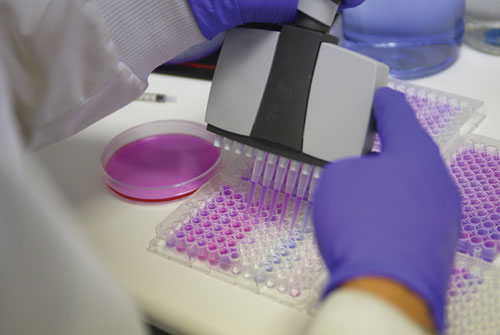
Last month we described the efforts of amfAR-funded scientists to uncover novel means of destroying
the
silent or latent reservoir of HIV that persists in memory CD4+ T
cells—the major obstacle to a cure. This month three amfAR grantees,
Drs. Ann Chahroudi and Guido Silvestri
of the Yerkes National Primate Research Center in Atlanta, Georgia, and
Dr. Mathias Lichterfeld of Massachusetts General Hospital, pursue
another component of this obstacle: the self-perpetuating memory stem
cell.
 Dr. Ann ChahroudiWriting in the March issue of
Current HIV/AIDS Reports, Drs. Chahroudi, Silvestri, and
Lichterfeld, note that just as every cell in the body is derived from
stem cells capable of differentiating into their mature progeny, T cells
also have precursor stem cells. These T stem cell
memory cells, TSCM, are fairly common, making up about one
in every 25 T cells circulating in the blood. And they appear to have a
potent dual role when it comes to HIV, acting to both combat the virus
and contribute to its persistence.
Dr. Ann ChahroudiWriting in the March issue of
Current HIV/AIDS Reports, Drs. Chahroudi, Silvestri, and
Lichterfeld, note that just as every cell in the body is derived from
stem cells capable of differentiating into their mature progeny, T cells
also have precursor stem cells. These T stem cell
memory cells, TSCM, are fairly common, making up about one
in every 25 T cells circulating in the blood. And they appear to have a
potent dual role when it comes to HIV, acting to both combat the virus
and contribute to its persistence.
On one hand, the researchers found that higher levels of the TSCM that ultimately become CD8+ T killer cells predict lower levels of HIV in untreated patients.
In addition, monkeys resistant to the pathologic effects of the simian AIDS virus, SIV, have TSCM
resistant to infection. On the other hand, they report that TSCM
that will eventually become the critical CD4+ T cell in humans are able
to be infected by HIV. In other words, the T cells may become (and
remain) HIV-infected very early in their maturation process. And because
they have stem cell characteristics, they may
be able to perpetuate HIV persistence indefinitely through self-renewal
and continuous differentiation into mature memory T cells.
Dr.
Chahroudi presented her findings at a small think tank hosted by amfAR
in mid-March in Las Vegas, Nevada. It was a session involving a dozen
scientists, including
active AIDS researchers and immunologists from other fields with
important information to share about attacking this issue. So we have
yet another avenue to explore in the search for an HIV cure.
Dr. Laurence is amfAR’s senior scientific consultant.